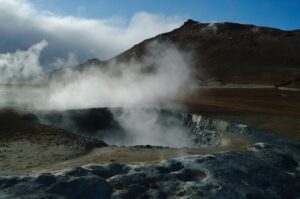Applications of Technology:
- Geothermal energy recovery
- General Enhanced Geothermal System (EGS) applications
Benefits:
- High temperature stability of microcapsules
- Control of microcapsule characteristics
- Microfluidic approach to creating capsules
Background: In Enhanced Geothermal System (EGS) reservoirs, high-permeability pathways between injection and production wells can lead to short-circuiting of the flow, resulting in inefficient heat exchange with the reservoir rock. There is a need to reduce the permeability of such pathways to increase the efficiency and longevity of EGS reservoirs.
Technology Overview: Scientists at Berkeley Lab have developed a technology that allows for the use of capsules containing diverter-forming chemicals to create masses in geothermal reservoirs, allowing for greater control over the flow-diverter formation. Key features of this technology include:
- Capsule design: The capsules are epoxy-resin shells containing chemical activators for flow-diverter, such as silicate gel or metal silicate. A standard shell has been designed to withstand moderately high temperatures (~ 200°C) of injected fluid for up to 1.5 hours.
- Tunable capsule characteristics: Capsules can be created with diameters in the range of 250-650 µm by adjusting capillary tubes, flow rates of the encapsulated fluid, and the type of UV-curable epoxy resin for the shell. This allows for control over the thermal degradation of the shell, providing control over the rate of release of the contained chemicals.
- Streamlined microfluidic production: A microfluidic system has been developed that can continuously produce capsules, allowing for the efficient and straightforward control of capsule properties.
Development Stage: Laboratory scale, similar system validation in relevant environment (TRL 5).
Principal Investigators: Chun Chang, Seiji Nakagawa, Timothy Kneafsey, Patrick Dobson
IP Status: Patent pending.
Opportunities: Available for licensing or collaborative research.
